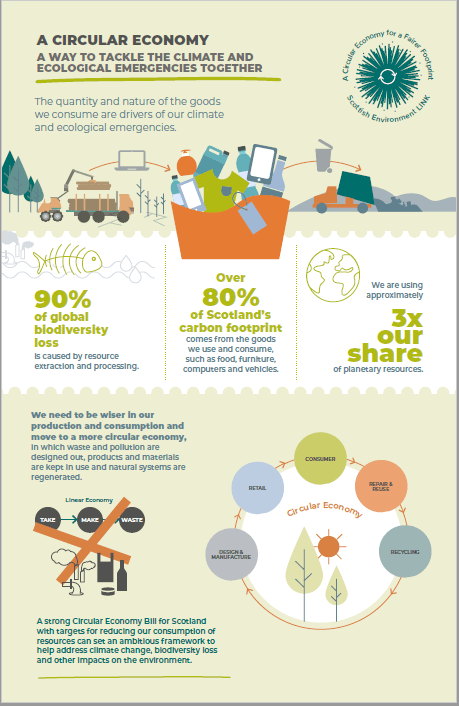
It is really important to move to an economy that is more circular. Our climate and ecological emergencies are closely linked to the quantity of products that we use and consume, how they are made and the way in which they are disposed. We need to re-programme our economy to extract less from the planet, re-use what we’ve already taken and reduce our waste. We need products that are made to last, are easy to repair and can be re-used many times; materials must be recyclable and we need to regenerate our damaged natural systems. Producers and retailers should be responsible for the whole life cycle impact of their products and we need governments to lead the way with a comprehensive and cross-cutting agenda on making our economy more circular.
The Circular Economy (Scotland) Bill was passed on 26th June 2024. This blog summarises the Bill’s journey. The Bill makes provisions in the following areas:
In parallel, Scottish Government is developing a circular economy route map to take forward circular economy measures from the Bill and others that don’t require legislation. This has been consulted on and the final version is expected before the end of 2024.
A Scottish Environment LINK survey shows the public want a less wasteful economy with lighter demands on the planet; where products are easy to repair, businesses are responsible and the Government leads the way. These findings have come at a critical time, with Governments now considering how best to stimulate the economy as part of the Covid recovery. Please see the press release and survey report
Survey report: Public attitudes on circular economy ( May 2020)
Scottish public want a less wasteful economy (press release, June 2020)
Watch our campaign film
Materials Matter – A Circular Economy bill for Scotland – have your say. June 2022. Joint LINK and Friends of the Earth Scotland discussing the Scottish Government proposals for a circular economy bill and route map. Summary report.
Roundtable event discussing the question: How to deliver reductions in Scotland’s material footprint and the approaches and policies / legislation needed. March 2022. Summary note
The role of Material Use in Mitigating Climate Change June 2021. Organised by Scottish Environment LINK and Stop Climate Chaos Scotland. This event heard from experts and explained why a focus on materials is important, which materials and products have the biggest impact, how these might be addressed and how climate change policy needs to broaden out if we are to really ‘end our contribution’ to climate change by 2050. Speakers: Prof. John Barrett, University of Leeds: slides , Matthew Fraser, Lead, Circularity Gap Reporting Initiative: slides , Kim Pratt, Zero Waste Scotland: slides
Residual waste – bury, burn or banish, Nov 2020. Speakers: Janet McVea, Scottish Government: Plans for 2025 targets and beyond; Michael Lenaghan, Zero Waste Scotland: The carbon impact of waste incineration; Enzo Favoino, Zero Waste Europe: A bridge strategy for optimised management of residuals; Jane Cherrington, Clean Green Future: Taking an ‘all Wales’ approach to reducing residual waste.
Circular Economy priorities for Scotland, Jan 2020. This event was held in the Scottish Parliament sponsored by Angus MacDonald MSP. A summary report is available with a link through to the presentation slides. The event was filmed and videos are available to watch – Professor John Barrett, Dr Richard Dixon, Penelope Vincent-Sweet, Questions and Discussions.
Pathways to a circular and resource efficient Scotland, December 2018. Seminar report.
This project (May 2018 – Oct 2022) aims to reduce our consumption of planetary resources. Unsustainable resource consumption is one of the main drivers of environmental degradation and biodiversity loss.
A circular economy (CE) is an alternative to a linear economy. A linear economy, which has increasingly characterised our economy in recent decades, follows an extract, make, use, dispose pattern. In contrast, a more circular economy aims to keep resources in use for as long as possible, extracting the maximum value from them whilst in use and recovering products and materials from them at the end of each service life. In a world of finite resources, the CE offers a system whereby we can reduce our demand on the planet’s resources and foster a more resilient economy.
The Scottish Government published its a CE strategy, Making Things Last, in 2016. The Programme for Government for 2019 – 20 announced a CE Bill.
The Circular Economy for a Fairer Footprint project is working with partners to press for a comprehensive and ambitious CE Bill with consumption reduction targets at its heart.
LINK is grateful to the Friends Provident Foundation for their 3 year grant in support of this project.
For any questions please contact Phoebe Cochrane, Sustainable Economics Officer, Email Phoebe
By continuing to use the site, you agree to the use of cookies. more information
The cookie settings on this website are set to "allow cookies" to give you the best browsing experience possible. If you continue to use this website without changing your cookie settings or you click "Accept" below then you are consenting to this.